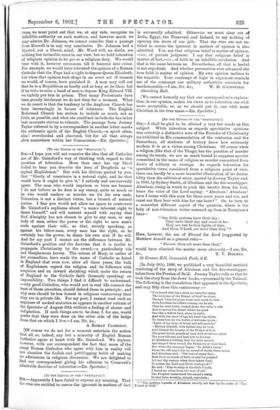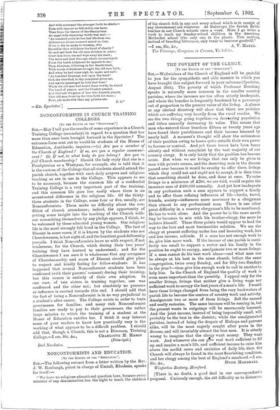To THE EDITOR OP THE "SPECTATOR. "] SIR,—I shall be glad
to be allowed a very few words on this subject. While toleration as regards speculative opinions was certainly a distinctive note of the Founder of Christianity (as exhibited in His commendation of the centurion and the Samaritan), all students of history know how extremely modern it is as a virtue among Christians. Of course when a religion (like that of the Thugs) has the practice of murder among its tenets, we are as much bound to suppress murder committed in the name of religion as murder committed from desire of robbery or revenge. As regards toleration for speculative views, considered from a religious point of view, there can hardly be a more beautiful illustration of its desira- bility than the rabbinical story, quoted by Jeremy Taylor and, in 1848, by Sydney Smith, of Abraham and the fire-worshipper. Abraham, rising in wrath to push the heretic from his tent, bears the voice of the Lord saying : " Abraham ! Abraham ! have I borne with this man for three score years and ten, and canst not thou bear with him for one hour? " Or, to turn to a somewhat different aspect of the question, where is the folly of non-toleration better summed up than in Tennysou's lines-
" Our little systems have their day ;
They have their day and cease to be They are but broken lights of thee,
And thou, 0 Lord, art more than they" ?
Here, however, the use of Eternal for Lord (suggested by Matthew Arnold as a general rule)— " Eternal, thou art more than they,"
would have clinched the matter more obviously.—I am, Sir, &c., T. V. HOLMES. 28 Croonis Hill, Greenwich Park, S.E.
[In July (9th), 1898, we published a very beautiful metrical rendering of the story of Abraham and the fire-worshipper, taken from the Persian of Sa'di. Jeremy Taylor tells us that he took the story from the Jews' books,—presumably the Talmud. The following is the translation that appeared in the Spectator, and may fitly close this controversy :—
" I've heard that for a week no traveller came, The welcome of the Friend of God• to claim, Though 'twits his pious wont each morn to wait Such foodless traveller's coming ere he ate. Then he went forth, looked down the valley's side And so across the desert where be spied One like a willow bent, alone in sight,
And with the snow of age his head was white. To cheer rum he the words of welcome spake
• Light of my eyes, of bread and salt partake.' —Raising himself, with lighter step he trod, And blessed the bounty of the Friend of God.
The guest-house guards at once with reverence greet The poor old man and lead him to his seat.
At Abraham's bidding they the table spread, And ranged them round, the Patriarch at their bead.
But when the company began—' In Allah's name,' From the old man's lips no sound of words there came.
And Abraham said ' Old man of many days, Had thou no words of faith or zeal for praise ?
lel not thy custom when thou takest food, To praise the Lord and Giver of all good ? • He said Fire-worship is the faith I hold, I learnt no other from the men of old.'
The Prophet understood the sinner's state, In that false woitship, ruined, reprobate ;
•
' The Arabian legends of Abraham usually call him by the name of ' TLc Friend of God.'" And with contempt the stranger forth he drare,—
Pure with impure no fellowship can have.
Then from the throne of the Omnipotent An angel with reproving words was sent An hundred years he has had life from me, Abhorrence in one moment seized on thee.
If me in fire he seeks to worship, why Should'st thou withdraw the hand of charity ?
Go and call back the old man stricken in years ; Greet him from me and wipe away his tears ; The tears and dust through which unconsciously From thy harsh judgment he appeals to me.'
Then Abraham, following in the desert track, With words of kindness brought the old man back, And when he had come nigh, ho apake and said : ' An hundred blessings rest upon thy head !
God, the true God, to thy complaint gives ear, And me his messenger he bids thee hear.'
When the old man had heard these words, he raised The hand of prayer, and the Creator praised.
And through the grace of him who heareth prayer, That old man found in the true faith his share ; Poor, yet more rich than any princes are.
Spectator.]
E. S."







































 Previous page
Previous page